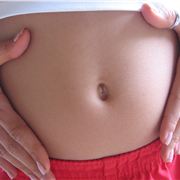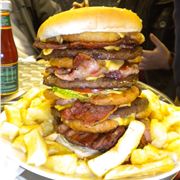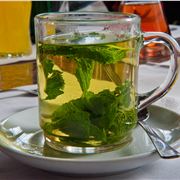HAVING analysed why we crave and/or eat the things we do, this last article in the ‘New Year - Know You’ series is going to concentrate on what’s going on after we’ve eaten. More specifically we’re going look at why, after eating, we can suffer from bloating, sluggishness and, perhaps more strangely, hunger.
Be mindful when you eat. That means no multitasking or eating on the run, but rather savouring every mouthful.
To address these issues let’s look first at the causes, starting with eating too quickly.
When we’re eating in a hurry we tend not to chew the food properly and gulp it down, at the same time taking in air. Your stomach isn’t able to distinguish between air and food and so each takes its place in filling the space. This can mean, despite eating a relatively small meal, you can feel bloated until the air you’ve ingested has been processed by the gut.
 Feeling bloated?Also, certain foods produce gas as they’re processed in your stomach. Some of the most commonly known ones include beans, Brussels sprouts, apricots and prunes. Do you remember the rhyme from your school days – beans, beans they’re good for your heart, the more you eat the more you...? Well, it’s true – they do. And until that gas has been expelled you can be left feeling the bloat.
Feeling bloated?Also, certain foods produce gas as they’re processed in your stomach. Some of the most commonly known ones include beans, Brussels sprouts, apricots and prunes. Do you remember the rhyme from your school days – beans, beans they’re good for your heart, the more you eat the more you...? Well, it’s true – they do. And until that gas has been expelled you can be left feeling the bloat.
The contents of your meal can also contribute to feelings of bloat. Food is processed by the stomach at different speeds depending on the consistency, size of the food particles and amount of fat. So, eating a meal that contains a large amount of difficult to digest foods like this can leave you feeling bloated.
Your meal contents can also be responsible for making you feel sluggish and in desperate need of forty winks. Meals that contain a large amount of fats, sugars, salts and preservatives, like ready meals and junk food, have very little nutritional value and so even though you initially feel sated, the feeling is quickly followed by lethargy. Bread and pasta are also huge culprits in this category. Along with simple sugars (chocolate, biscuits etc) they create an insulin spike which gives you a quick rush of energy followed by a big slump.
 Size mattersFinally, could it simply be the size of your meal that’s causing the problem? Our stomachs will stretch to accommodate extra food, but it really doesn’t like it and that dislike manifests itself as a bloated feeling.
Size mattersFinally, could it simply be the size of your meal that’s causing the problem? Our stomachs will stretch to accommodate extra food, but it really doesn’t like it and that dislike manifests itself as a bloated feeling.
Think about the last time you went out for a celebratory meal. If you’re anything like me you properly overindulged a bit (why does the dessert trolley always look so delicious?) and ended up loosening the belt by one notch or popping open the button of your jeans discretely under your top. Also, the more food you consume, the more energy your body needs to process it. Energy diverted to processing your meal cannot be used to keep you alert and vitalised, thus leaving you feeling sluggish.
To eliminate these post meal problems try the following simple tips:
Slow down!
Be mindful when you eat. That means no multitasking or eating on the run, but rather savouring every mouthful.
Chew your food properly. I’m not going to tell you to count how many times you chew each piece of food, but you really want to be making it as close to liquid (or very small particles) as you can to give your stomach a helping hand.
Monitor how you feel when you eat any of the gas producing foods. It’s unusual for you to be super sensitive to all of them, so once you know which ones really affect you (apricots for me) you can limit your intake and avoid the discomfort.
 Peppermint teaTry using ginger, fennel or peppermint infusions after eating to reduce gas and the associated feelings of bloat.
Peppermint teaTry using ginger, fennel or peppermint infusions after eating to reduce gas and the associated feelings of bloat.
Avoid processed foods – they generally have a high fat, sugar, salt and/or preservative count which will do little to fuel your body.
Cut out the caffeine – yes it initially gives you a high but can leave you feeling drained
Avoid sugars and starchy carbohydrates (potatoes, pasta etc) at lunchtime. Instead, make sure your meal includes a good portion of quality protein and lots of green veg/salad.
So there we have it, we now know what we eat, why we eat it and why it makes us feel the way we do. But, it’s not enough to know all of this information if we don’t use it, so make sure you check out my next article when I’ll be sharing with you my Fit for Life Plan designed to help you work with your body and burn fat.
Read previous articles in this series here:
New Year, Know You - Introduction
Sara Perry is a Personal Trainer & Development Coach passionate about helping women over the age of 40 live fitter, happier and healthier lives.
For more information visit www.renaissance4women.com or email info@renaissance4women.com



